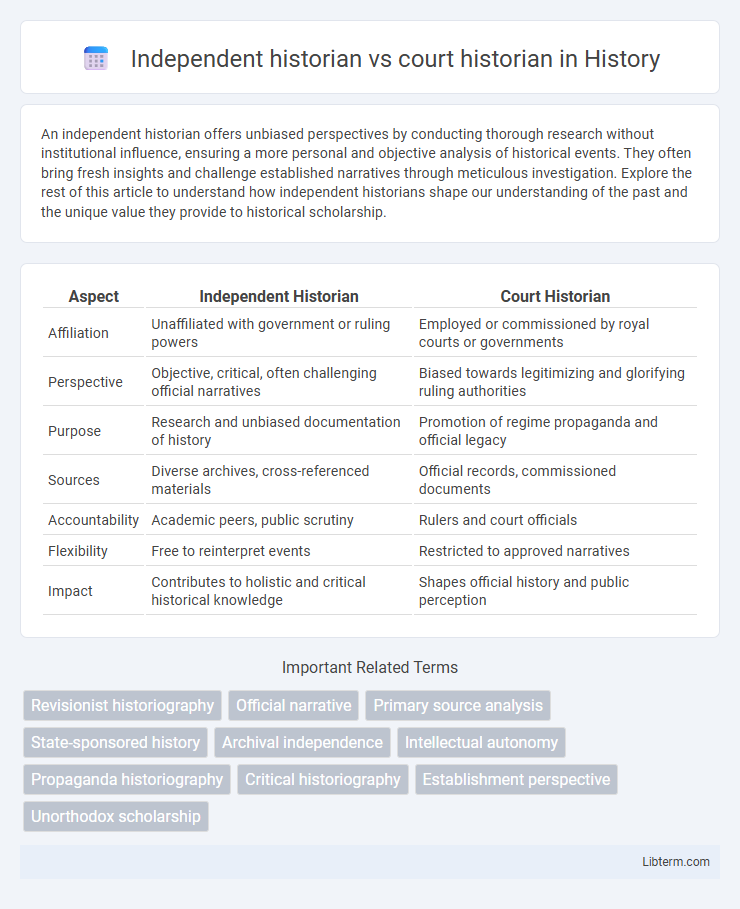An independent historian offers unbiased perspectives by conducting thorough research without institutional influence, ensuring a more personal and objective analysis of historical events. They often bring fresh insights and challenge established narratives through meticulous investigation. Explore the rest of this article to understand how independent historians shape our understanding of the past and the unique value they provide to historical scholarship.
Table of Comparison
| Aspect | Independent Historian | Court Historian |
|---|---|---|
| Affiliation | Unaffiliated with government or ruling powers | Employed or commissioned by royal courts or governments |
| Perspective | Objective, critical, often challenging official narratives | Biased towards legitimizing and glorifying ruling authorities |
| Purpose | Research and unbiased documentation of history | Promotion of regime propaganda and official legacy |
| Sources | Diverse archives, cross-referenced materials | Official records, commissioned documents |
| Accountability | Academic peers, public scrutiny | Rulers and court officials |
| Flexibility | Free to reinterpret events | Restricted to approved narratives |
| Impact | Contributes to holistic and critical historical knowledge | Shapes official history and public perception |
Defining Independent and Court Historians
Independent historians conduct research and analysis without formal ties to governmental or institutional authorities, allowing them to maintain objectivity and critically evaluate historical events. Court historians, often employed or appointed by ruling authorities or institutions, typically produce narratives that support official perspectives and legitimize those in power. The defining distinction lies in the source of affiliation and the degree of autonomy in interpreting historical facts.
Origins and Roles in Historical Context
Independent historians trace their origins to scholars outside official power structures, focusing on objective analysis using diverse sources free from state influence. Court historians emerged in ancient and medieval eras primarily as chroniclers serving monarchs or ruling elites, tasked with legitimizing regimes and shaping official narratives. While independent historians emphasize critical inquiry and pluralism, court historians prioritize maintaining political authority through carefully curated historical accounts.
Motivations and Allegiances
Independent historians prioritize objective analysis and critical evaluation of sources to challenge prevailing narratives, driven by a commitment to scholarly integrity and truth. Court historians often align their work with the interests and perspectives of ruling authorities, motivated by loyalty, patronage, or the desire for political favor. This divergence in motivations influences their allegiances, with independent historians maintaining academic freedom, whereas court historians support state or royal legitimacy.
Methodological Approaches
Independent historians employ diverse methodological approaches, emphasizing critical analysis of primary sources, cross-disciplinary perspectives, and the inclusion of marginalized voices to challenge dominant narratives. Court historians typically adhere to methodologies that align with official state ideologies, often privileging sanctioned documents and narratives to legitimize ruling powers. The contrast highlights methodological divergence, where independent historians prioritize evidentiary rigor and pluralism, while court historians focus on preserving institutional continuity through selective historiography.
Challenges to Objectivity
Independent historians face challenges to objectivity stemming from limited access to official archives and pressure from political or social groups, which can bias their interpretations. Court historians, often appointed or sponsored by ruling authorities, grapple with overt influences to produce narratives that favor state interests, compromising impartiality. Both roles require careful navigation of source credibility, yet independent historians may struggle more with resource constraints while court historians encounter systemic bias.
Influence on Public Perception
Independent historians often challenge dominant narratives by offering diverse interpretations of historical events, which can lead to a more nuanced public understanding. Court historians typically promote official perspectives aligned with ruling powers, shaping public perception to reinforce existing political or cultural agendas. The contrast between these roles significantly influences collective memory and the way societies interpret their past.
Interaction with Political Power
Independent historians maintain scholarly objectivity by analyzing historical events without direct influence from political authorities, ensuring impartial interpretations based on evidence. Court historians often operate under the patronage of ruling powers, which can lead to biased narratives that legitimize and reinforce political agendas. The interaction of court historians with political power results in historiography that serves state interests, whereas independent historians prioritize academic integrity over political considerations.
Impact on Historical Narratives
Independent historians often provide diverse perspectives by critically analyzing sources without institutional constraints, which can lead to more nuanced and varied historical narratives. Court historians typically produce accounts that align with the ruling power's agenda, resulting in narratives that emphasize legitimacy and reinforce official ideologies. The contrasting approaches significantly shape public understanding of history, influencing collective memory and cultural identity.
Ethical Considerations in Historical Writing
Independent historians prioritize objectivity and transparency, often navigating ethical challenges by critically analyzing sources without institutional bias, ensuring a diverse perspective on historical events. Court historians, typically employed by governments or ruling bodies, may face pressures to align narratives with official agendas, raising concerns about impartiality and the potential manipulation of facts. Ethical considerations in historical writing demand vigilance against propaganda, the inclusion of marginalized voices, and adherence to rigorous standards of evidence to maintain integrity across both independent and court historical works.
Contemporary Relevance and Legacy
Independent historians offer diverse perspectives and critical analyses that challenge official narratives, promoting a more nuanced understanding of historical events in contemporary discourse. Court historians often align their accounts with prevailing political powers, shaping history to support state agendas and legitimize ruling regimes. The lasting legacy of independent historians lies in their contribution to pluralistic historiography, while court historians' work tends to reflect and reinforce institutional authority.
Independent historian Infographic

 libterm.com
libterm.com